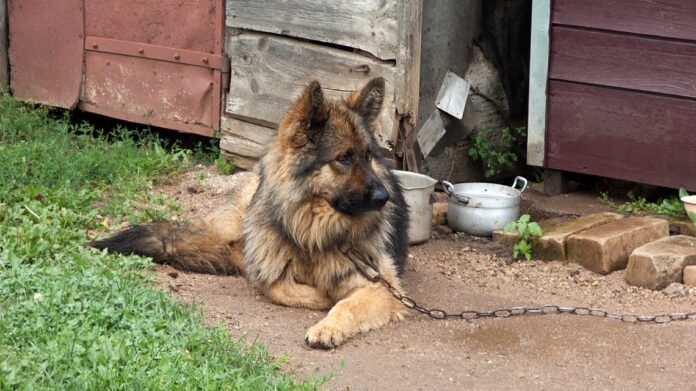Animal rights advocates want lawmakers to advance legislation that expands on a tethering bill passed last year by the General Assembly. The new legislation would increase the minimum length of a tether and adds conditions that include temperature, severe weather and require the animal to be brought inside when the owner isn’t home.
Senate Bill 272, introduced by Sen. John Bell, D-Loudoun, would increase the required length of the tether from 10 feet or three times the length of the animal to 15 feet or four times the length of the animal.
Under the bill, pets can’t be tied during a heat advisory or if a severe weather warning has been issued, including hurricane, tropical storm or tornado warnings. The bill outlaws tethering in temperatures 32 degrees Fahrenheit or lower or 85 degrees Fahrenheit or higher, between the hours of 10 p.m. and 6 a.m. and when an owner is not home.
Last session, a bill expanded the law from a 3-foot tether to 10 feet. That bill, introduced by Sen. Lionell Spruill, D-Chesapeake, originally carried the same language as Bell’s current bill, but it was amended by a Senate committee.
Robert Leinberger, animal control supervisor for Richmond Animal Care and Control, said that some parts of the bill may be difficult to enforce. Still, if the legislation gets passed, Leinberger said, it will make a difference because people will be forced to be more aware of the law. He said more people will call to report instances of animals being improperly tethered.
“For example if it’s inclement weather, when it’s really super cold or really super hot, then we do occasionally see more calls for service because of the animals left out,” Leinberger said.
Kate Riviello, a New York-based animal rights activist who also works in Virginia, supports that the bill outlaws outdoor tethering when the temperature is below 32 degrees. Virginia law currently requires that an animal must have access to water, but the water doesn’t make a difference if it freezes, she said.
Riviello also supports “Tommie’s Law,” legislation passed last year that made animal cruelty a felony in Virginia. The law is named after a pit bull that died after he was set on fire. Riviello said she is happy to see the changes Virginia is making to protect the rights of animals but there is still a lot of work that needs to be done to continue in the right direction.
“With ‘Tommie’s law,’ I think it was really tremendous that they took that step,” Riviello said. The key also is to enforce animal rights’ laws, Riviello said, which isn’t always the case.
Leinberger said implementing animal rights’ legislation is important because it enables people to better care for their pets. Tethering is just one issue that needs to be addressed, he said.
The bill is awaiting action by the Senate’s Agriculture, Conservation and Natural Resources Committee.

